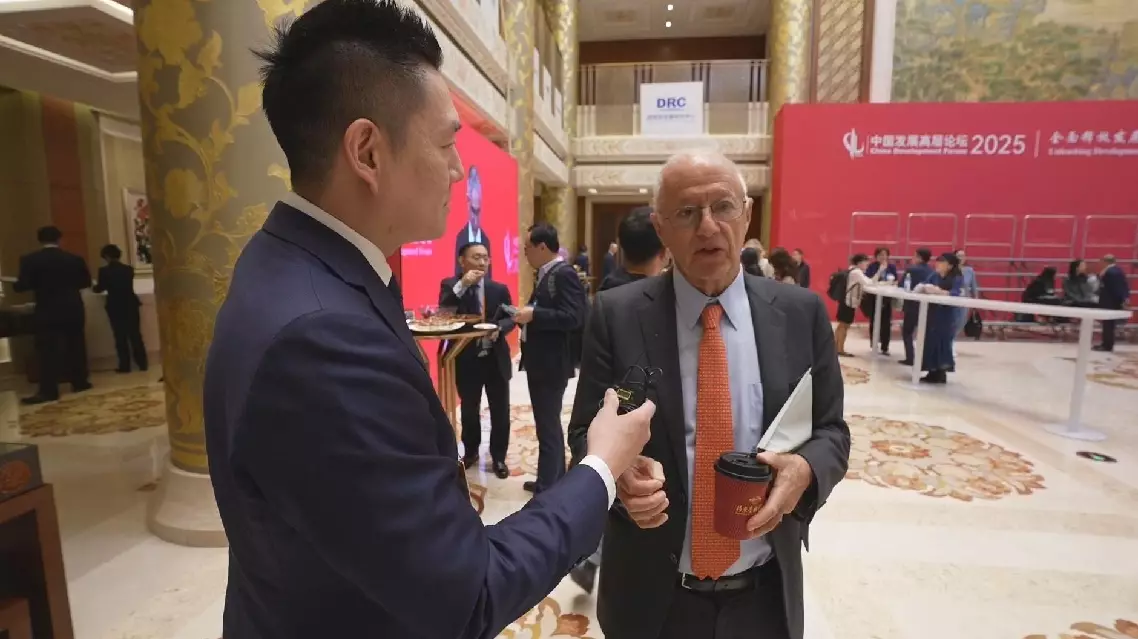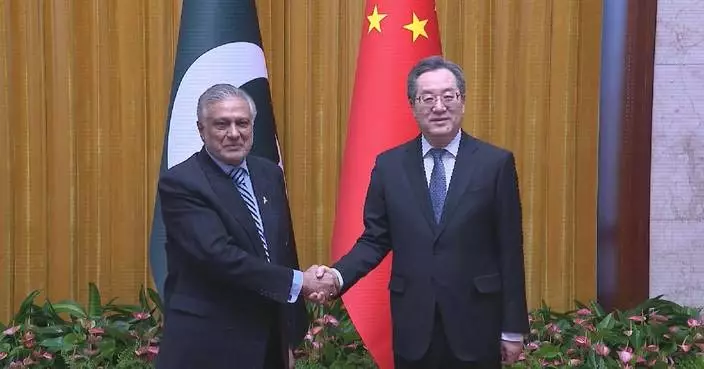Chinese Premier Li Qiang's speech at this year's China Development Forum is set to carve out a new path for the development of China-U.S. relations, said Stephen Orlins, president of the National Committee on U.S.-China Relations.
The China Development Forum 2025 kicked off in Beijing on Sunday, with Premier Li delivering a keynote speech at the opening ceremony.
In the speech, Li talked about bold moves of boosting Chinese spending to shrink trade surpluses.
Orlins said this could unlock a historic reset: more U.S. exports to China, fewer deficits, and a pragmatic path to stabilize global growth.
"The (Chinese) premier demonstrated that the Chinese leadership knows what to do in terms of improving the Chinese economy. I think some of the suggestions that he had in the speech were very imaginative. For instance, the very long-term bond that he said he would do. I think he said 400 billion RMB (about 55.18 billion U.S. dollars) issuing of that, and that would be used to enhance consumer spending," he said.
"To the extent that consumer spending increases, we will see a drop in China's export surplus, which is a good thing for U.S.-China relations. So I listened to his speech and I said, hey, this is probably good for U.S.-China relations, because the extent that the Chinese economy improves, U.S. exports to China can improve. That can reduce the U.S.-China trade in the case of U.S. deficit, in the case of China surplus, and that will lead to improved U.S.-China relations," said Orlins.
Themed "Unleashing Development Momentum for Stable Growth of Global Economy", the forum features 12 symposiums and several closed-door sessions.
The participants will explore key issues including the development of new quality productive forces, AI innovations, green development, and new trends in economic globalization.
The forum, sponsored by the Development Research Center of the State Council and organized by the China Development Research Foundation, has become a key platform for dialog and cooperation between China and the rest of the world since its inception in 2000.

Chinese premier's speech carves out new path for China-US relations: expert
Citizens of the Republic of Korea (ROK) have shared their views and expectations for future cooperation with China ahead of President Lee Jae Myung's state visit, which began in Beijing on Sunday.
Lee is making his first visit to China since assuming office in June 2025, with the state visit scheduled to run until Wednesday.
Street food vendor Jang Dong Il said he had high expectations for the visit, hoping it would lead to effective cooperation between the two countries and improvements in the economic environment for mutual benefit.
"More exchanges between the two countries would boost for the two economies. I am full of hope for a strong cooperation between President Lee Jae-myung and President Xi Jinping," he said.
"I have high hopes for this meeting between our countries' leaders. President Lee Jae Myung is visiting China between January 4 and January 7, to discuss economic, cultural and tourism exchanges.I understand about 200 to 300 South Korean corporate executives have traveled with him. I have high hopes for this. If this visit helps strengthen relations between two leaders,I believe it could lead to a win-win outcome and bring ROK and China closer together," Yang said.
"The leaders' meeting can spark dynamic exchanges in economy and culture. More exchanges between the two countries would boost the two economies. I am full of hope for a strong cooperation between President Lee Jae-myung and President Xi Jinping," said Noh Yun Ji, a teacher.
"The two can complement each other economically and continue to develop," said Kim Yoon Jung, a Seoul resident.
Dancer Yoon Ji Eun shared her experience of visiting Shanghai, saying that the delicious food suited her taste and that the city’s fashionable, clean urban environment left her with a positive impression of China.
"Last summer, I took a trip to Shanghai, and after seeing it for myself, I found the food was to my taste, and the city was modern and clean. So I came to see China as a captivating country," Yoon said.
"First of all, China is a very large country. And the food is delicious. I enjoy dishes like malatang and hot pot.I love Chinese food," Noh said.
The ROK citizens also expressed hope for strengthened people to people exchanges with China.
Recalling her time studying dance in China, Yoon said her experience highlighted the role of education in fostering cultural understanding.
"Although I don’t know much about this, as I mentioned, I went to Shanghai for dance lessons. It shows education can offer cultural experiences," she said.

South Koreans hope president’s first visit to China will enhance exchanges










